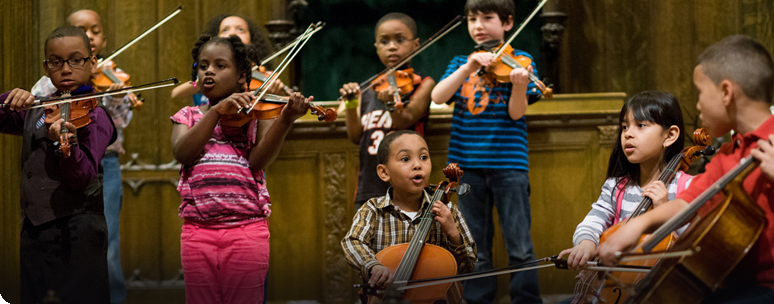CMW alums: Rhode Island Latino String QuartetEarlier this fall, I left Boston and several hours later found myself landing at San Francisco International Airport. I transformed myself from a full-time Clinical Research Assistant to a violinist on my plane ride, soon to become a part of the Quinteto Latino’s American Chamber Music Festival. When I reached San Francisco what awaited me were a couple hours of rehearsal with the rest of the quartet. In between musical pieces and yawns, we prepared ourselves for the busy days that lay ahead. Over the summer, Natasha, Luis, Joshua, and I decided to form a quartet, which we named the Rhode Island Latino String Quartet. We had the opportunity to meet up and practice each week, sight read as well as perform at a couple of events. We were fortunate enough to meet Armando Castellano, a French horn player and educator from San Jose, California, through CMW’s Institute for Musicianship and Public Service. There, we learned about his organization and his quintet. Throughout his musical education, he did not have the opportunity to learn and play music by Latin composers and so his quintet makes it their mission to play only pieces written by Latino and Latin American composers. Recognizing the importance of being connected with the community in which the both live in and play their music in, Quinteto Latino plays in local elementary, middle, and high school, from which a large majority of the students are of a Latino background. This year, Quinteto Latino decided to host its first Latin American Chamber Music Festival, which lasted about one week, and to which we were invited to take part. During the week, we had the opportunity to host workshops at a couple of different public schools in the area and really took the time to not only create a musical connection with the students but also get to know them as individuals. We were fortunate enough to perform with them at the end of the week in San Jose and San Francisco. During the time that I was there I had the opportunity to interact with musical professionals that all came from very diverse cultural and musical backgrounds. We let go of the classical music that we are constantly exposed to in our respective instrument lessons and introduced our five senses to a different kind of music. The sounds of the Argentine Tango, classical Mexican Folk music, the sounds of Venezuela that were transformed into a musical masterpiece, and the thoughts transcribed into musical notes of a young Brazilian Composer all made their ways into our ears and into our hearts. Being there reminded me of my musical experience growing up while I learned the violin at Harry Kizirian Elementary School in Providence, where one teacher was expected to teach us music in the one forty-five minute time slot allotted to us. When we walked into Hoover Elementary School, all the kids took out their photocopied piece of music with fingerings and eagerly played Mary Had a Little Lamb for us. I exchanged a couple of words with the teacher and said, “Must be hard to teach so many kids at once,” to which she replied, “Well, I’ve been doing it for a while now.” This sheds light on the need to create not only better music education programs in our schools but also the need to create more individualized learning time into education in general. We also had the chance to collaborate with a nonprofit organization, Enriching Lives through Music (ELM), which provides individual and group music education for youth in San Rafael’s Canal neighborhood. It was through this organization that I was able to understand CMW’s mission of transforming lives and minds through music even more. Their respect towards us gave me goosebumps; they looked up to us. They wanted to be like us and their emotions and attitude, and their eagerness to listen to us left me in awe. While a student at CMW, I looked up and continue to look up to everyone at CMW for their passion and eagerness to intertwine the transformative aspect of music to their every lesson and interaction with students. Although this is just a snippet of the whole festival, it is what stood out for me the most. It was an incredible opportunity and we’re really grateful for that. Sunday morning, we each headed back to our respective lives. I think it was a good opportunity to really reflect on our musical careers, what music really means to us, and why we continue to engage in music despite our careers and lives. As someone who did not end up studying music as a career, music still remains a part of me, that allows me to connect to others and exchange much more than the notes on our music-filled pages. It allows me to continue to create a social impact and connect to those who use music as a way to create social change, and to me, that’s the most beautiful part of it all. -Sidney Argueta, CMW and Brown University graduate and violinist for the Rhode Island Latino String Quartet.
|
